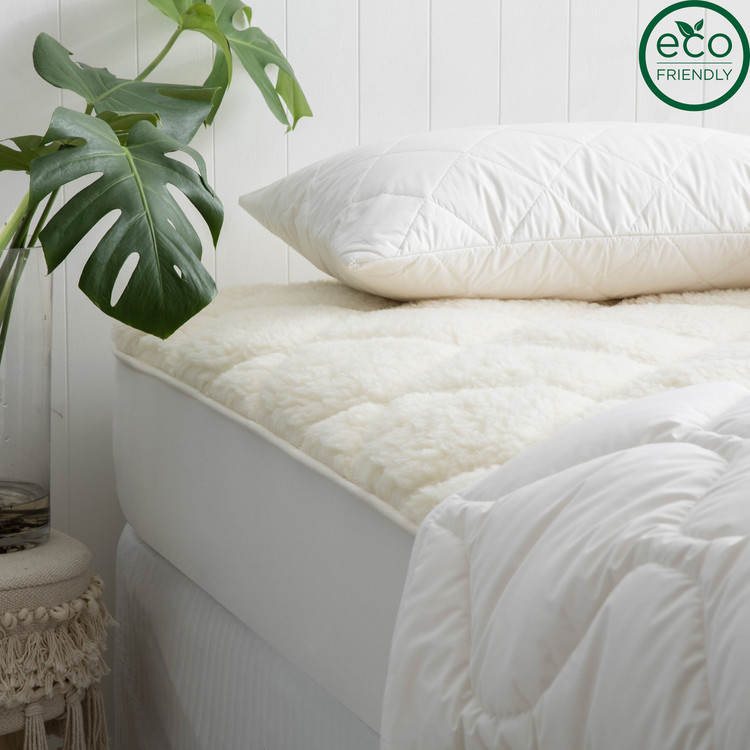Are Wool Bedding Products Good for Eczema?
26th Oct 2023
Eczema is a persistent skin condition that plagues countless individuals, bringing with it itchiness, redness, and discomfort. Finding relief often means reevaluating many facets of daily life, including the materials that come in direct contact with the skin. Among these, bedding emerges as a crucial focus. So, is wool better than polyester for those with eczema?
Understanding Eczema and Its Triggers
Before addressing wool's suitability, it's vital to comprehend what eczema is and what can exacerbate it. Eczema, also known as atopic dermatitis, is characterised by patches of inflamed skin that can itch, crack, and even bleed. While the exact cause remains a subject of research, external irritants play a significant role in flare-ups.
Common triggers include:
- Harsh soaps and chemicals
- Allergens such as pollen and pet dander
- Certain fabrics and materials
When it comes to bedding, the material you sleep on plays a pivotal role. It's in direct contact with your skin for extended hours, making its choice paramount for those with eczema.
Wool and Its Eczema-Friendly Attributes
Wool has been a popular choice for bedding for ages. But how does it fare for those with sensitive skin or eczema? Let's assess its properties:
Natural and Chemical-Free: Unlike some synthetic fabrics that might be treated with chemicals, wool is organic, often reducing the risk of skin irritation. For those debating if wool is better than polyester, this natural edge of wool is a significant consideration.
Moisture Management: Moist environments can be breeding grounds for bacteria and microbes, which can worsen eczema. Wool's inherent ability to wick away moisture ensures a drier sleep environment, reducing potential irritants.
Breathability: Wool fibres promote better air circulation. This breathability ensures that you don't overheat at night, a factor that can intensify itching and discomfort for eczema sufferers.
Hypoallergenic: Wool's structure and natural oils deter dust mites, a common allergen, reinforcing the claim that wool pillows are good for allergies and asthma.
Comparing Wool to Other Bedding Materials
When seeking the best bedding material for your skin, it's helpful to compare wool's attributes with other materials:
Wool vs. Synthetic Materials: As mentioned earlier, synthetic materials might contain chemicals or have a texture that irritates the skin, making wool a preferred choice for many with eczema.
Wool vs. Cotton: While cotton is soft and breathable, it doesn’t offer the same moisture-wicking capabilities as wool, making the latter more favourable in managing eczema symptoms.
The Added Health Benefits of Wool Bedding
Apart from its eczema-friendly attributes, wool bedding offers other health advantages:
Relief from Chronic Pain: Due to its cushioning nature, wool bedding can be comfortable for those with chronic pain, showcasing how wool bedding relieves chronic illness pains.
Allergy Management: As highlighted earlier, the hypoallergenic nature of wool makes it a top pick for allergy sufferers.
Maintaining Wool Bedding for Optimal Benefits
To ensure wool retains its skin-friendly properties, proper maintenance is essential:
Regular Cleaning: Use mild detergents to wash wool bedding. This ensures any accumulated allergens or irritants are removed.
Airing Out: Regularly airing your wool bedding ensures any trapped moisture evaporates, maintaining its hypoallergenic properties.
Storing: When not in use, store wool bedding in a cool, dry place. This prevents moisture build-up, ensuring the bedding remains fresh and free from potential irritants.
____
For eczema sufferers, the journey to relief often requires thoughtful choices in daily life. Bedding, being in constant contact with the skin, plays a significant role in managing and potentially reducing flare-ups. Wool, with its natural, moisture-wicking, and hypoallergenic properties, emerges as a top contender in the quest for skin-friendly bedding. If eczema affects you or a loved one, considering wool as a bedding material might just be the step towards a more comfortable and itch-free night.

